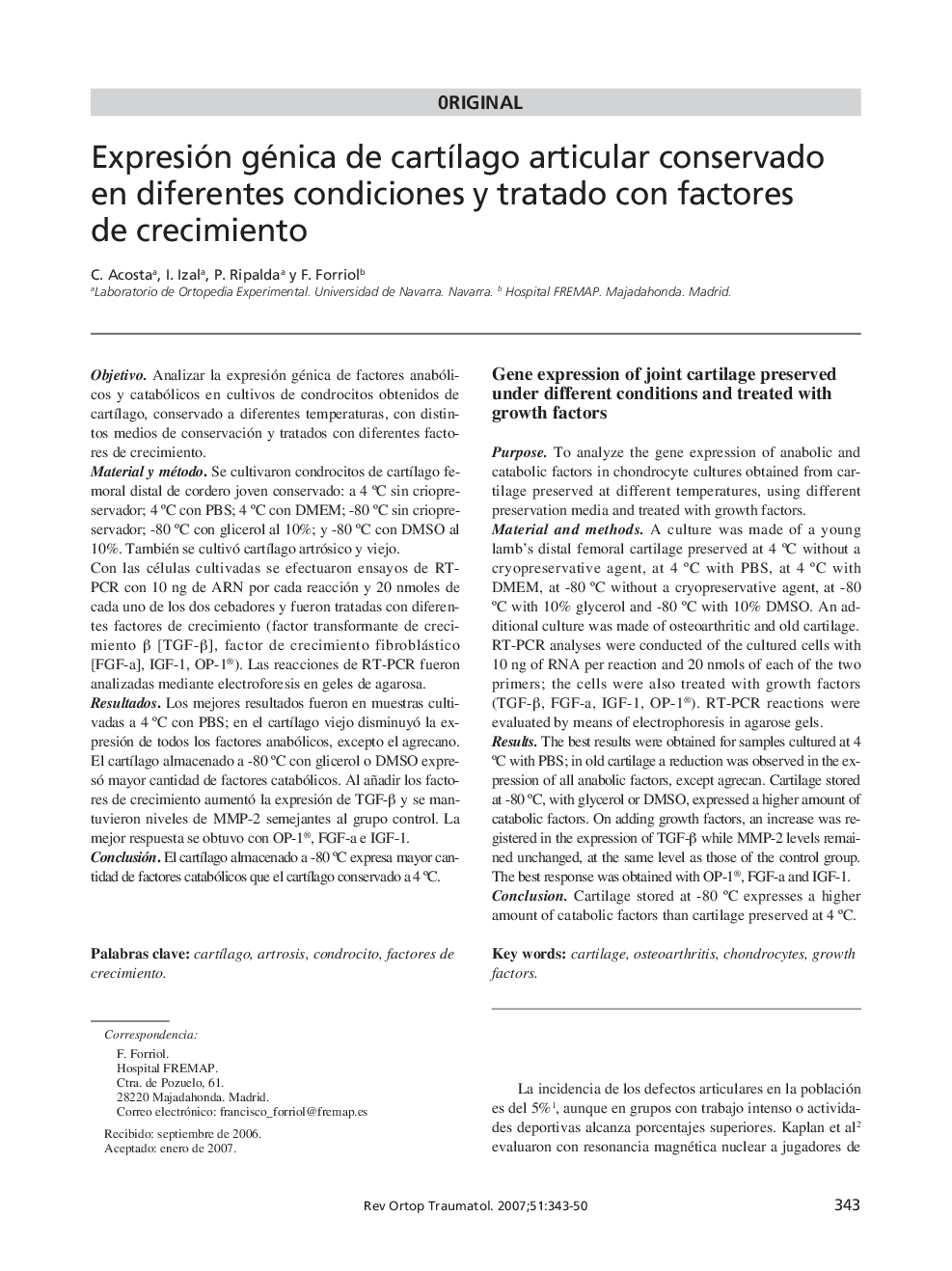| کد مقاله | کد نشریه | سال انتشار | مقاله انگلیسی | نسخه تمام متن |
|---|---|---|---|---|
| 4087945 | 1605003 | 2007 | 8 صفحه PDF | دانلود رایگان |

ObjetivoAnalizar la expresión génica de factores anabólicos y catabólicos en cultivos de condrocitos obtenidos de cartílago, conservado a diferentes temperaturas, con distintos medios de conservación y tratados con diferentes factores de crecimiento.Material y métodoSe cultivaron condrocitos de cartílago femoral distal de cordero joven conservado: a 4 °C sin criopreservador; 4 °C con PBS; 4 °C con DMEM; -80 °C sin criopreservador; -80 °C con glicerol al 10%; y -80 °C con DMSO al 10%. También se cultivó cartílago artrósico y viejo.Con las células cultivadas se efectuaron ensayos de RT-PCR con 10 ng de ARN por cada reacción y 20 nmoles de cada uno de los dos cebadores y fueron tratadas con diferentes factores de crecimiento (factor transformante de crecimiento β [TGF-β], factor de crecimiento fibroblástico [FGF-a], IGF-1, OP-1®). Las reacciones de RT-PCR fueron analizadas mediante electroforesis en geles de agarosa.ResultadosLos mejores resultados fueron en muestras cultivadas a 4 °C con PBS; en el cartílago viejo disminuyó la expression de todos los factores anabólicos, excepto el agrecano. El cartílago almacenado a -80 °C con glicerol o DMSO expresó mayor cantidad de factores catabólicos. Al añadir los factores de crecimiento aumentó la expresión de TGF-β y se mantuvieron niveles de MMP-2 semejantes al grupo control. La mejor respuesta se obtuvo con OP-1®, FGF-a e IGF-1.ConclusiónEl cartílago almacenado a -80 °C expresa mayor cantidad de factores catabólicos que el cartílago conservado a 4 °C.
PurposeTo analyze the gene expression of anabolic and catabolic factors in chondrocyte cultures obtained from cartilage preserved at different temperatures, using different preservation media and treated with growth factors.Material and methodsA culture was made of a young lamb's distal femoral cartilage preserved at 4 °C without a cryopreservative agent, at 4 °C with PBS, at 4 °C with DMEM, at -80 °C without a cryopreservative agent, at -80 °C with 10% glycerol and -80 °C with 10% DMSO. An additional culture was made of osteoarthritic and old cartilage. RT-PCR analyses were conducted of the cultured cells with 10 ng of RNA per reaction and 20 nmols of each of the two primers; the cells were also treated with growth factors (TGF-β, FGF-a, IGF-1, OP-1®). RT-PCR reactions were evaluated by means of electrophoresis in agarose gels.ResultsThe best results were obtained for samples cultured at 4 °C with PBS; in old cartilage a reduction was observed in the expression of all anabolic factors, except agrecan. Cartilage stored at -80 °C, with glycerol or DMSO, expressed a higher amount of catabolic factors. On adding growth factors, an increase was registered in the expression of TGF-β while MMP-2 levels remained unchanged, at the same level as those of the control group. The best response was obtained with OP-1®, FGF-a and IGF-1.ConclusionCartilage stored at -80 °C expresses a higher amount of catabolic factors than cartilage preserved at 4 °C.
Journal: Revista de Ortopedia y Traumatología - Volume 51, Issue 6, December 2007, Pages 343-350